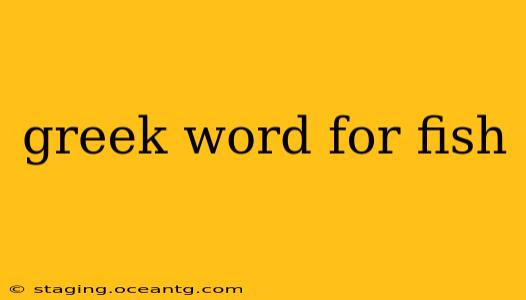The most commonly known Greek word for fish is ἰχθύς (ichthys). However, understanding the nuances of the Greek language reveals a richer vocabulary surrounding this aquatic creature. While ichthys is the most familiar term, several other words existed depending on the context, the type of fish, and even the time period. This exploration goes beyond the simple answer to delve into the fascinating history and usage of these words.
What is the most common Greek word for fish?
The most common and widely recognized Greek word for fish is indeed ἰχθύς (ichthys). This word is the basis for the "ichthys" symbol, a secret symbol used by early Christians, formed by the first letters of the Greek phrase "Ἰησοῦς Χριστός, Θεοῦ Υἱός, Σωτήρ" (Iēsous Christos, Theou Huios, Sōtēr), meaning "Jesus Christ, Son of God, Savior." Its enduring presence in Christian symbolism highlights the significance of this single word.
Are there other ancient Greek words for fish?
Yes, ancient Greek possessed a wider vocabulary for fish, reflecting the variety of species and their cultural significance. While ichthys served as a general term, more specific words existed. Unfortunately, a comprehensive list is difficult to compile due to the evolution of language and the regional variations in ancient Greece. However, some examples include:
- ὀξύρυγχος (oxýrynchos): Referring to a type of fish, likely a sturgeon, characterized by its pointed snout.
- σαῦρος (sauros): While often translated as "lizard," this term could also refer to certain types of fish, particularly those elongated in shape. The context was crucial for accurate interpretation.
- κητος (kētos): This word described a large sea creature, often mythical or monstrous in nature. Think of it as a broader term encompassing whales, sea monsters, and potentially large fish.
What were some fish-related words in ancient Greek?
Beyond words for specific fish, ancient Greek also boasted a range of terms connected to fishing and fish consumption. This reflects the integral role fish played in the lives of ancient Greeks:
- ἁλιεύς (halieus): Fisherman. This word paints a picture of the individuals who were instrumental in acquiring fish as a food source.
- ἀλιεία (alieia): Fishing. The act of catching fish, representing an important economic and societal activity.
- ἰχθυοτροφεῖον (ichthysotrofeion): Fish farm. While not as common in ancient times as today, evidence suggests some forms of fish farming were practiced, leading to the need for a descriptive term.
What is the difference between Ichthys and other Greek words for fish?
The primary difference lies in specificity. Ichthys served as a general term, encompassing a wide range of fish. Other words, like oxýrynchos or sauros, described more specific types of fish or possessed additional connotations based on their physical characteristics or cultural associations. The choice of word depended on the context and the writer's intent.
How many different words are there for fish in ancient Greek?
Pinpointing an exact number of words for fish in ancient Greek is challenging. Many words might have fallen out of common usage or are poorly documented. Additionally, regional dialects and the passage of time have contributed to the loss of some terms. However, we know that the vocabulary was more extensive than simply ichthys, highlighting the importance of fish in Greek society and culture.
This exploration illustrates that while ichthys remains the best-known Greek word for fish, the language offered a nuanced and rich vocabulary reflecting the diversity of aquatic life and its significance in ancient Greek life.
